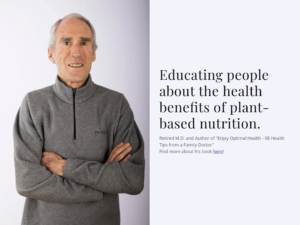 FEBRUARY IS HEART MONTH—DO YOU AND YOUR LOVED ONES HAVE HEALTHY ARTERIES?
FEBRUARY IS HEART MONTH—DO YOU AND YOUR LOVED ONES HAVE HEALTHY ARTERIES?
Health column by Dr. Greg Feinsinger. Champion of Whole Food Plant Based Living and righteous person.
During heart month (February), Compass Peak Imaging in Glenwood (970-665-4238) is having a special on carotid IMTs, one of the two commonly-used tests available to see if you have atherosclerosis (hardening of the arteries), the cause of heart attacks and most strokes. Why is it important to have this test done?
Heart attacks are the number 1 cause of death in American men and women, and can occur in people as young as their early 30s. For 20 percent of heart attack victims, the first sign of heart disease is the last—sudden death. Knowing if you have atherosclerosis is important, because essentially all heart attacks are preventable. Unfortunately, most heart attacks are not prevented in this country, because of the tendency in American medicine to look at heart disease as a plumbing problem with blockages that need to be stented or bypassed, rather than a medical disease that can be prevented, treated and even reversed.
The most important risk factors for atherosclerosis—and therefore heart attacks—are the following: smoking; high blood pressure (> 120/80); high total cholesterol; high LDL (bad cholesterol); low good cholesterol (HDL); high triglycerides; pre-diabetes and diabetes; obesity, particularly central obesity (heaviness around the middle); sleep apnea; inflammation; sedentary lifestyle; the S.A.D. (standard American diet); age (women over 50, men over 40); stress; and family history of cardiovascular disease. If arteries are stressed by one or more of these risk factors, the endothelium—the organ that lines the arteries– starts to thicken. Eventually plaque (hardening of the arteries) develops.
Plaque sometimes causes incomplete, chronic blockages in the coronary (heart) arteries, usually causing no symptoms, but sometimes causing chest pain with exertion (angina), and rarely causing a heart attack. However, 99 percent of plaque is in the wall of our arteries, not causing a blockage or symptoms. Over 85 percent of heart attacks occur when this non-obstructive plaque ruptures, resulting in complete blockage of a coronary artery, leading to death of part of the heart muscle—and 20 percent of the time death of the patient.
A carotid IMT is a ten-minute, painless doppler study of the carotid arteries in the neck, which are right under the skin and therefore easily accessible. It looks at the thickness of the endothelium, and a “vascular age” is given by comparing your reading to an average American man or woman your age. If your vascular age is 5 years or greater than your actual age, you are at significant risk for a cardiovascular event (heart attack or stroke). IMT also looks at plaque, which is defined as any localized thickening 1.3 mm or greater. Unfortunately, plaque is not figured into the “vascular age” on the reports from commercial IMT companies, such as Vasolab or CardioRisk. Providers who aren’t well-versed in heart attack prevention often tell their patients that their arteries are fine if the endothelial thickness is “normal,” even if plaque is present–even though plaque means cardiovascular risk regardless of the endothelial thickness. At Compass Peak Imaging, radiologist Liz Kulwiec, M.D., reads the IMT studies, and produces reports that base risk on endothelial thickening AND plaque.
Brad Bale, M.D., a family physician in Spokane, WA, started doing heart attack prevention over 25 years ago, before anyone else was doing it (other than plant-based advocates Dr. Ornish and Dr. Esselstyn). He and his nurse practitioner, Amy Doneen, R.N., PhD, developed the Bale-Doneen Method of Heart Attack Prevention, which is considered one of the most effective heart attack prevention programs in the U.S. A few years ago they published the evidence-based book “Beat the Heart Attack Gene.” Bale and Doneen feel that everyone should have a carotid IMT at age 40—younger if significant risk factors are present. If you already have a diagnosis of atherosclerosis, IMT can be useful in gaging effectiveness of treatment (get a baseline study, then repeat a year after starting optimal treatment). The IMT is a much more sensitive test than the usual carotid ultrasound done by hospitals and traveling screening companies such as Life Line Screening, which just screen for major blockages.
The downside of the IMT test is that it looks at the carotid rather than the coronary arteries, but there is a 95 percent correlation between the two. If you have risk factors but have a normal IMT, you should consider a coronary calcium score—a CT scan of the heart which measures how much calcified plaque you have in your coronary arteries. The problem with that test, other than a small amount of radiation, is that some people—particularly men under 40 and women under 50– can have uncalcified (“soft”) plaque, resulting in false negative results. A coronary calcium score can be obtained at most hospitals and imaging centers, and is not useful for gaging effectiveness of treatment (higher score on a repeat test a year later could be a good thing if unstable, soft plaque has become calcified).
Let’s say you have a screening IMT and you do have abnormalities indicating early or advanced atherosclerosis. Next week’s column will be about what you can do about it. There will also be a power point presentation about this at Compass Peak at 6:30 p.m. on March 4th.
Leave a Reply